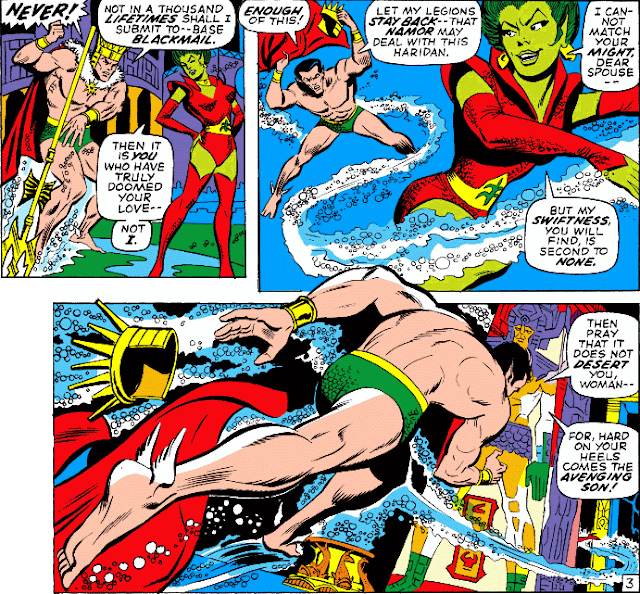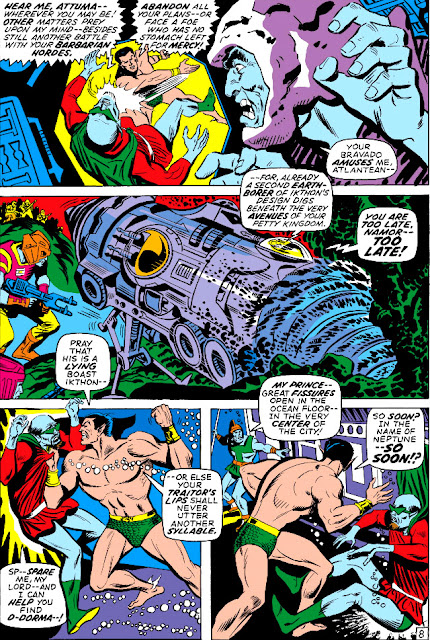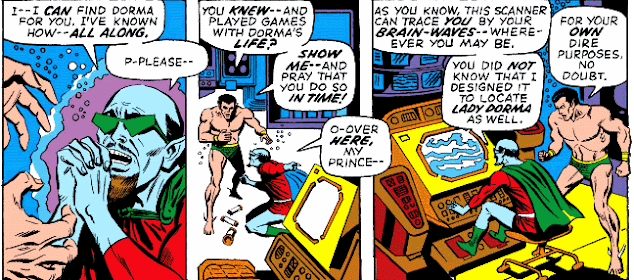The wedding day of the Sub-Mariner was filled with reflection, celebration, pomp, and, it probably goes without saying, the din of battle. But when it came time for the main event, and the joining between Namor and the lady Dorma was complete, it also included one hell of a showstopper.
Yes, Llyra, Namor's vengeful enemy from when she ruled Lemuria with an iron fist, had returned to seize total power--and more, as we can see. And before her revenge had run its course, Namor would be forced to make an impossible choice--and, perhaps, a fatal one.
"...And One Must Die!" blares this issue's cover. You're going to want to take that seriously.
With the facade of his "bride" now dropped, Namor's first order of business with his arrogant foe is to demand to know what she's done with Dorma--information which Llyra is only too happy to pass on, as it serves to cement her hold over her lawfully wedded "husband." Spirited away to a hidden location by a trio of Lemurians still loyal to Llyra, Dorma's life hangs on a single condition: that Namor acknowledge what she feels Atlantean law has already made fact, and declare that Llyra is indeed his bride.
You can imagine what the furious Namor's response will likely be to such a demand, particularly when it involves the safety of the one he loves.
Obviously, Namor has his own ideas on how to ensure Dorma's safety as well as her safe return. We'll never know if his methods might have met with success, or whether Llyra might have had another trick up her sleeve to save herself, thanks to the intervention of Proteus--who presided over the marriage ceremony and who is able to foil Llyra's plan, one that depended on legalities for its success but which now collapses when the law turns against her.
We don't know what precisely makes Llyra so swift that only Namor's speed is a match for her--heels aren't fins, after all, and she has only average strength. More than likely it's simply a contrivance by writer Roy Thomas to make her escape at this point in the story possible; and escape she does, using her power to command a group of hammerhead sharks to delay Namor's pursuit until she streaks out of sight.
Frustrated beyond belief, Namor has no choice but to play a waiting game, even though Llyra has vowed that Dorma's life was now forfeit. Eventually, he pays a visit to Ikthon, his trusted chief scientist, for help in locating her--but it would seem that this is a day for infamy, as Namor instead encounters a traitor.
Thus, instead of pursuing Ikthon's claim of being able to locate Dorma, Namor must now divert his attention to another attack from Attuma--one that, in his current mood, results in defeat for the barbarian along with the burial of his deadly borer device. The battle (along with, collectively, a full page of ads) takes up over four pages of precious story space in a 20-page tale, which leaves the reader with a feeling of a ticking clock that is quickly running out on Dorma's prospects for survival.
Racing back to deal with Ikthon, Namor discovers the traitor hurriedly gathering his scrolls for a quick departure--scrolls containing hard evidence that all the equipment and machinery used in Attuma's previous attack on Atlantis were provided by Namor's own chief scientist. And as Namor turns to likely deliver a death blow in response, Ikthon fearfully bargains with the only chip remaining to him--a compelling one, to be sure.
Ignorant of the dramatic events which take place in the next issue, the reader has no reason to begin thinking along the lines of Dorma's continued worth to the book in the eyes of those who plot its course for the months ahead, and perhaps every reason to believe that Namor will prevail and recover her safely. And even in hindsight, it's a bit like watching the film Titanic and thinking, regardless of what you know to be true, that somehow this time the ship will swerve just enough to avoid its fate. Regardless, Thomas scripts Llyra superbly in these final moments--a villainess who virtually choreographs her revenge and enjoys its moments to the fullest. And while she almost pays for her overconfidence, her plan succeeds completely, and she escapes virtually unscathed.
(A slight slip-up by artist Ross Andru as Dorma clobbers Llyra--did you spot it?)
By this time, the "choice" that Thomas has expended no small effort to establish as one that, boiled down, translates to Namor choosing between the safety of Atlantis and his bride's life has no real substance, given that Llyra had more than enough time to slay Dorma well before Namor streaked off to rescue her. With the collapse of Llyra's main scheme while in Atlantis, it's clear that her end game in the oceanarium depended on Namor's arrival in the vicinity, in a sequence of events that would have eventually played out no matter how long she had to hold Dorma in captivity. It would seem, then, that the choice that Thomas sets up for Namor to make only serves the purpose of establishing Atlantis in Namor's eyes as a harsh impediment to his happiness, in order to facilitate the course of action that Namor takes in the following issue. Yet the foundation of how it factors into this story's climax, as well as into what occurs afterward, appears shaky at best.
That said, the parting scene above was nevertheless a powerful denouement which greeted those readers who had been witness to the long road that the lady Dorma followed in Sub-Mariner tales, finally ending as it began--with her complete devotion to her prince. And in the story's final panels, Namor's anguished cry seems to resonate well beyond the story just read, as if the character has reached a turning point which was never captioned thus on either the issue's cover or its splash page.
Even as fiction on a printed page, it's an almost heart-rending image of Namor leaving the abandoned facility, more totally alone than ever before, carrying home the corpse of his bride on their wedding day--with Andru's riveting depiction of his departure giving the impression that Namor's pace toward the ocean is slow and unsteady, his mood somber and disconsolate. The future would hold further upheaval for the Sub-Mariner--more's the pity.
 | Sub-Mariner #37 Script: Roy Thomas Pencils: Ross Andru Inks: Mike Esposito Letterer: Artie Simek |

















2 comments:
One aspect Of Andru's work during his brief run on this title worth commenting on is his figure work...unlike many others, he reminds you subtlely that these are people underwater - they aren't flying, they're swimming. He also throws in trails of bubbles and occasional schools of fish swimming by in the foreground to remind the reader exactly where the scene is taking place. Compare that to the scene between Namor and Proteus in the previous issue where we're to believe that they're sitting at some kind of campfire on the ocean floor!
(Don't get me wrong, I loved Sal B's work at this time; he hadn't got to stage where he was cranking it out)
It's a pity Andru couldn't have stayed longer on the book, I think he was quite suited to it.
I quite agree about the importance of those reminders of an underwater environment, B. In fact, it occurs to me how cool it would be to go about our business in our day-to-day lives while having schools of fish occasionally swim by. :)
Post a Comment